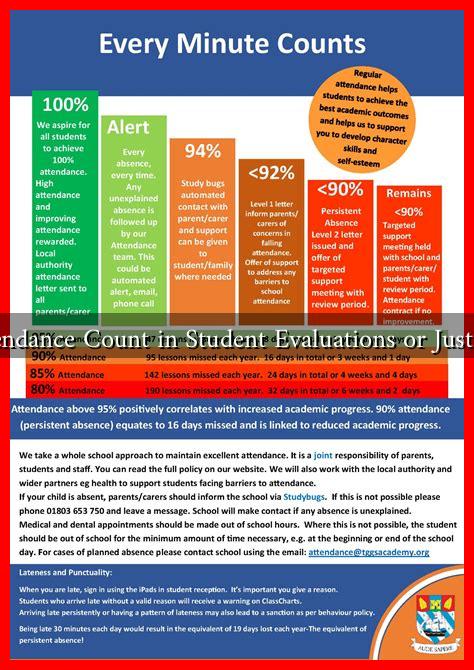-
Table of Contents
Should Attendance Count in Student Evaluations or Just Objectives?
The debate over whether attendance should be a factor in student evaluations has been ongoing for years. Educators, students, and parents often find themselves on opposite sides of this issue. While some argue that attendance is a crucial indicator of a student’s commitment and engagement, others believe that evaluations should focus solely on academic performance and objectives. This article explores both sides of the argument, providing insights, examples, and statistics to help clarify this complex issue.
The Case for Attendance in Evaluations
Proponents of including attendance in student evaluations argue that it reflects a student’s dedication and responsibility. Here are some key points supporting this perspective:
- Engagement and Participation: Regular attendance often correlates with higher levels of engagement in the classroom. Students who attend classes consistently are more likely to participate in discussions, collaborate with peers, and seek help when needed.
- Real-World Skills: Attendance teaches students essential life skills such as punctuality, responsibility, and time management. These skills are vital in the workplace, where attendance and reliability are often evaluated.
- Academic Performance: Research has shown a strong correlation between attendance and academic success. A study by the National Center for Education Statistics found that students who attended classes regularly had higher GPAs compared to their peers with poor attendance records.
For instance, a case study conducted at a large university revealed that students with an attendance rate of 90% or higher had an average GPA of 3.5, while those with attendance below 70% averaged a GPA of 2.0. This stark contrast highlights the potential impact of attendance on academic performance.
The Argument Against Attendance as a Metric
On the other hand, critics of using attendance as a criterion for evaluations argue that it can be an unfair measure of a student’s abilities and knowledge. Here are some points that support this viewpoint:
- Individual Circumstances: Students may face various challenges that affect their ability to attend classes, such as health issues, family responsibilities, or work commitments. Penalizing them for circumstances beyond their control can be unjust.
- Focus on Learning Outcomes: Evaluations should prioritize what students learn and how well they can apply that knowledge, rather than their physical presence in a classroom. This approach aligns with modern educational philosophies that emphasize mastery of content over mere attendance.
- Alternative Learning Environments: With the rise of online education and hybrid learning models, attendance in a traditional sense may not be applicable. Students can engage with course materials and demonstrate understanding without being physically present.
For example, a survey conducted by the Online Learning Consortium found that 70% of online students reported that they were able to learn effectively without the need for traditional classroom attendance. This suggests that learning outcomes can be achieved through various means, making attendance less relevant.
Finding a Balance
Given the arguments on both sides, it is essential to find a balance that recognizes the importance of attendance while also valuing academic performance and individual circumstances. Here are some potential solutions:
- Flexible Attendance Policies: Schools could implement flexible attendance policies that allow for excused absences due to valid reasons, ensuring that students are not unfairly penalized.
- Hybrid Evaluation Models: Combining attendance with objective assessments can provide a more comprehensive view of a student’s performance. For instance, a percentage of the final grade could be allocated to attendance, while the majority focuses on assessments and projects.
- Encouraging Engagement: Instead of strict attendance policies, educators could incentivize participation through interactive activities, discussions, and collaborative projects that encourage students to attend without making it a punitive measure.
Conclusion
The question of whether attendance should count in student evaluations is complex and multifaceted. While attendance can indicate a student’s commitment and correlate with academic success, it is essential to consider individual circumstances and the evolving landscape of education. A balanced approach that values both attendance and academic performance may provide the most equitable solution. Ultimately, the goal of education should be to foster learning and growth, ensuring that all students have the opportunity to succeed, regardless of their attendance record.
For further reading on this topic, you can explore resources from the Edutopia website, which offers insights into effective teaching practices and student engagement strategies.


